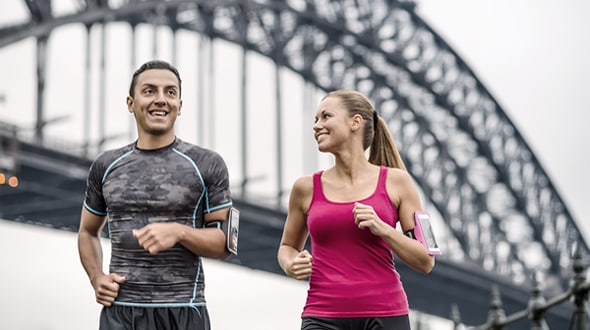Fight travel fatigue with running
When you travel for business, running helps you shake off the effects of the journey and get to know your new surroundings.
Health Agenda magazine
July 2016
International travel can be a joy. It’s a chance to escape the daily grind, and explore faraway lands and unfamiliar cultures. It provides opportunities to overcome challenges, have unexpected adventures, form unlikely friendships, create lifetime memories and comprehend fundamental truths about the world – and yourself.
But long-haul travel, particularly by plane, also has a down side. Flick through a few issues of the Journal of Travel Medicine or Travel Medicine and Infectious Disease – two academic publications almost entirely dedicated to the negative effects of air travel – and you could be forgiven for suddenly developing a fear of flying.

The risks of air travel
Flying's lengthy rap sheet includes increased risk of deep-vein thrombosis, greater exposure to germs and the spectre of accelerated ageing. Sitting still for so long undermines your diet and exercise regime, while jet lag can cause mood swings, sleep problems and anxiety.
In fact, a trip overseas can send stress levels sky high. Having to navigate foreign cultures and languages while on alert for safety threats compounds the pressures of travel such as getting to the airport on time and with luggage intact.
In some ways, long-haul travel seems incompatible with a healthy lifestyle. But for a growing number of business people, it’s an essential part of the job. So how do you neutralise the side effects and stay healthy overseas?
Richard Telford, a professor at the University of Canberra’s Research Institute for Sport, is a former Australian Rules’ footballer, cricket player, Olympic running coach and one of Australia’s leading sports scientists. He says exercise such as running is the key to good health and the antidote to any negative complications arising from travel.
Sightseeing on foot
“There’s no doubt about it – running and similar forms of exercise are great for you,” says Telford. “It helps keep your biochemistry in good equilibrium so you’re able to function more effectively, as well as control your blood sugar and hormones. This is achieved with physical activity because that’s what the body is designed to do.”
Anecdotal evidence seems to support this. Read any article about a business high-flyer, for example, and they inevitably credit exercise, particularly running, with keeping them mentally and physically fit.
“The most successful executives I know have the discipline to keep themselves fit, and often running is a core element of their training,” says Peter Effeney, CEO of Queensland IT company SPARQ Solutions. “It clears the mind and puts worries into perspective.”
A disciplined runner himself for more than a decade, Effeney, now in his 50s, runs five to 10 kilometres most mornings. He says the routine requires minimal planning, gets him out and about, and sets him up for the day, especially when travelling.
And unlike a hotel gym, it allows him to explore the city. “It’s easy to travel and see nothing but the hotel and office. Running gets you into the local environment, plus there’s minimal gear required so it’s good for packing light,” he says.
Effeney also believes running can deliver the most memorable moments of a trip. “I saw the sights of London in a 10 kilometre loop, ran through New York’s Central Park and around the deck of a cruise ship in the Baltic, which makes a great GPS track,” he says.
Paul Cheal, General Manager of New South Wales PR consultancy, Honner, agrees. “It’s a way to get off the beaten path and see a city.” Cheal travels about twice a month, mainly within Australia, and has been running for about 10 years.
He aims to clock up three runs a week and at least 1,000 kilometres a year. “It’s about disconnecting from your daily routine – a time to think about everything or nothing,” says Cheal. “Running helps me to release stress, concentrate and be more present.”
Backed by science
Telford adds that science backs up these feelings of wellbeing, and the ‘rush’ of endorphins during intense exercise such as running is well-documented. “Running affects your psychology and psychology affects your running,” he says.
“We know genes are modified by what we do, and training modifies how our genes operate – that’s the study of epigenetics – so now we’re placing a lot more emphasis on how training can affect people’s lives.”
It’s likely continued research into running will uncover new benefits to our health and wellbeing. Sean Williams, a running coach for 20 years, has already identified one he considers invaluable – the reprieve it offers from our increasingly connected, digital lifestyle.
“Rather than the high-tech modern men and women we’ve become, people reliant on technology and creature comforts, it’s a way to get back to nature: putting one foot in front of the other, building up a sweat and getting a puff going,” says Williams, who has two athletes competing in the 2016 Rio Olympics.
“I also like to try to defy the age barrier,” he adds. “I’ll be 50 next year and running certainly helps with fighting the constraints of age.”